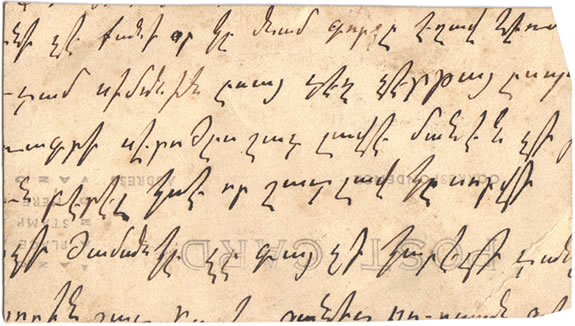Can anyone decipher the writing on this image?

It appears on the back of a photo of a gentleman who was born in Russia of an Armenian family. Unfortunately part of the inscription is missing.
Last week the first bilingual Cornish/English creche or Skol dy’Sadorn Kernewek (Cornish Saturday School) opened its doors for the first time. The group is being held on Saturdays at the Cornwall College in Cambourne and children between 2 and 5 years old are attending. The children are immersed in Cornish in one room, and their parents learn Cornish in another. The Cornish lessons for the parents focus particularly on language they can use with their children.
You can see a video of the creche here.
According to this article, the creche and the Movyans Skolyow Meythrin (The Nursery Schools Movement) was set up by a Welsh man who works as an early years lecturer at the Cornwall College and who was impressed by the success of a simliar creche in Spain where English and Basque are used and where he used to work.
Here’s a recording in a mystery language.
Do you know or can you guess which language it’s in and where it’s spoken?
I came across an interesting site today about Scottish Gaelic in Nova Scotia – Cainnt Mo Mhàthar (My Mother’s Language), which contains videos and audio recordings of Gaelic speakers from Nova Scotia, as well as information about the Gaelic language and culture of that region. The site is in both English and Gaelic.
Naff is a British slang word meaning unstylish, lacking taste, rubbish or inferior and is an antonym of nang, cool, groovy, nifty, etc. Its etymology is uncertain, according to this source.
Is naff used elsewhere in the English-speaking world? If not, what do you use instead?
The word nang was mentioned the other day on a programme about the Noughties on the BBC. It has apparently entered London slang, means ‘cool’ or ‘good’ and comes from the name of a Vietnamese kid at a school in Hackney, London (source).
Have you heard this word before?
What word(s) do you use for cool/good?
The Welsh word ig (plural: igion) means hiccough. The verb, to hiccough / sob, is igian, igio or igion.
When I’m singing or playing the tin whistle or other wind instruments I often get hiccoughs, and the other day I was trying to explain this to a Welsh friend in Welsh, but didn’t know the Welsh word for hiccup. So I looked it up.
The English word hiccough (also spelt hiccup) is thought to be an imitation of the sound of hiccoughs, and the Welsh word ig probably is as well.
In other languages hiccough is:
Czech: škytavka
German: Schluckauf
Dutch: hik
French: hoquet
Irish: snag
Italian: singhiozzo
Spanish: hipo
The medical terms for hiccough are synchronous diaphragmatic flutter (SDF), or singultus, from the Latin, singult, “the act of catching one’s breath while sobbing”.
Do you have any good cures for hiccoughs?
I usually hold my breath and/or drink water.
Here’s a recording in a mystery language.
Do you know or can you guess which language it’s in and where it’s spoken?

One of the things we discussed at the French conversation group last night was wind turbines, or les éoliennes in French. I hadn’t heard the word before and it took me a while to work out its meaning, but I knew it had something to do with the wind as Aeolus (Αἴολος) was the ruler of the winds in Greek mythology. Eventually I realised what it was from the context.
The word aeolian also appears in aeolian harp (harpe éolienne), a harp played by the wind; aeolian processes (érosion éolienne), wind generated geologic processes; the Aeolian Islands (Les Îles Éoliennes), the Aeolian mode of music, a musical mode; and Eolianite (L’éolianite), a sandstone formed from wind transported sediment.
According to this report, the UK Schools Secretary, Ed Balls, would like all secondary pupils in UK schools to have the opportunity to learn Mandarin. One reason for this is that a poll of employers found that Chinese is the most useful language for employees to know after French and German.
The poll, conducted by the Confederation of British Industry (CBI) in 2008, found that 52% of employers wanted French speakers, 43% wanted German speakers, 38% wanted speakers of Mandarin or Cantonese, and 28% wanted Spanish speakers.
The UK government would also like there to be a greater range of languages offered in primary schools, including Mandarin, Arabic and Japanese.
Critics of these plans point out that the government should be worry about the ever decreasing number of pupils are studying any languages at secondary level, and that there aren’t enough teachers of Mandarin and other languages.
There’s an comment piece on this story in the Telegraph in which the writer claims that schools should concentrate on improving the English of pupils, rather than trying to teach them ‘difficult’ languages like Chinese. This is a common argument when languages are mentioned – many believe that today’s youth have poor English, especially written English, and don’t know their grammar, and therefore shouldn’t waste time learning foreign languages. Such opinions are often based on impressions, prejudices and are rarely backed up with evidence.
Are such arguments used in other countries?